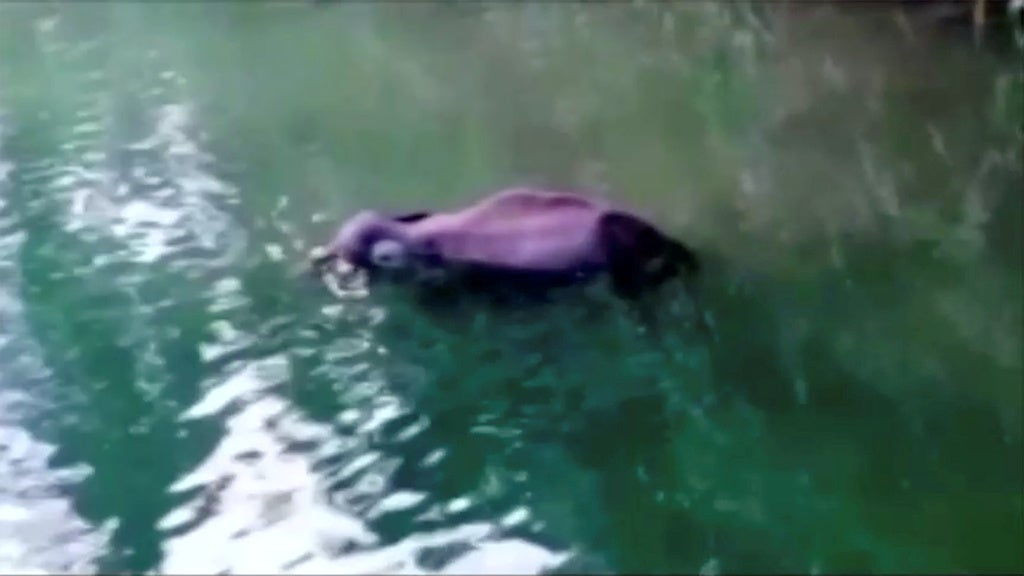Pregnant elephant killed by firecracker hidden in pineapple in India
It comes as poachers in Africa kill at least six elephants in one day.
Your support helps us to tell the story
From reproductive rights to climate change to Big Tech, The Independent is on the ground when the story is developing. Whether it's investigating the financials of Elon Musk's pro-Trump PAC or producing our latest documentary, 'The A Word', which shines a light on the American women fighting for reproductive rights, we know how important it is to parse out the facts from the messaging.
At such a critical moment in US history, we need reporters on the ground. Your donation allows us to keep sending journalists to speak to both sides of the story.
The Independent is trusted by Americans across the entire political spectrum. And unlike many other quality news outlets, we choose not to lock Americans out of our reporting and analysis with paywalls. We believe quality journalism should be available to everyone, paid for by those who can afford it.
Your support makes all the difference.A pregnant wild elephant was killed in southern India when she was thought to have eaten a pineapple planted with a firecracker that exploded.
The 15-year-old animal stood in the river for hours after the blast apparently to try to get relief from the cool water for its badly wounded mouth and tongue.
Indian conservationists and animal lovers worldwide have been outraged and deeply upset by the use of the explosive, many believing that the mammal was targeted because elephants raid crops intended for humans.
However, others say firecrackers – small explosive devices designed to be noisy – are often used by locals in the state of Kerala, southwest India, to protect their fields against wild boars, and the elephant stumbled across one of these traps.
Kerala is already at the centre of attention of wildlife lovers, because captive elephants there are beaten, chained, whipped, hit with sharp hooks, and denied food or water when they are “trained” to obey human commands.
The elephant had emerged from Kerala’s Silent Valley forest in search of food when it came across the pineapple. She was unable to eat anything because of her injuries, according to India’s NDTV.
Kerala Forest Department officials say they are trying to identify the people responsible.
The department asked in a tweet where people’s humanity was. “There’s no conclusive evidence that injury to lower jaw was caused by pineapple stuffed [with] cracker. However, this may be a possibility. Dept has booked offence against unknown offenders, whose identity is being established,” officials posted.
Forest officer Mohan Krishnan, who was part of a rapid response team that rushed to the rescue, wrote on Facebook that the animal had trusted everyone.
“She didn’t hurt even a human being in the village search for food… When I see her she is standing face down… thin and tired.”
Forest officials tried to use two captive elephants to lead the injured one out. “But I think she had a sixth sense. She didn’t let us do anything,” Mr Krishnan wrote.
After several days, the expectant mother died, standing in water. Officials moved and cremated the body, he said.
“I felt like tears were falling into the river. Protest of the river in front of human selfishness… She slept in the land where she played in her childhood.”

Sangita Iyer, director and producer of award-winning elephant documentary Gods in Shackles, said she was asking authorities to impose the highest penalties and jail sentences. “No words to describe this heinous crime,” she posted.
“I can’t imagine what must’ve gone through her mind. Surely, she must be thinking about her baby. What had she done to deserve this? A ruthless murder of an innocent animal!”
At the same time, in Africa, poachers killed at least six elephants in one day. Wildlife officials in Ethiopia said the criminals removed the tusks. It was the largest such slaughter in memory in the country in the horn of Africa.
Officials are investigating whether two other elephants were also killed the same day.
Poaching and habitat degradation have reduced Ethopia’s elephant numbers to about 2,500 to 3,000, from 10,000 in the 1970s.
Mystery also surrounds the mass deaths of elephants in Botswana in the past two months.
At least 110 have died in the country with Africa’s highest elephant numbers. Wildlife officials have ruled out poaching because no ivory has been taken.
Initial test results have ruled out poisoning and anthrax, and samples will now be sent to neighbouring South Africa for further tests, VOA News reported.

Join our commenting forum
Join thought-provoking conversations, follow other Independent readers and see their replies
Comments